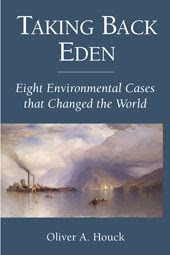This week I wrote an article about the BP oil spill in the Gulf of Mexico for Southern Weekly, a publication based in Guangzhou, China. The article, which was translated into Chinese, explored why such an environmental catastrophe could occur in U.S. waters despite the U.S. having one of the world’s best developed systems of environmental law. It also examined what lessons China can learn from the spill. On Monday July 12 Interior Secretary Salazar issued a new moratorium on new deepwater drilling activities until November 30. The moratorium is a more refined version of the May 27 moratorium that has been blocked by a federal district judge in New Orleans. Instead of applying to all new drilling activities in waters 500 feet deep or more, it applies to the 33 deepwater wells using subsea blowout preventers or surface blowout preventers on a floating facility. On Thursday the House Natural Resources Committee approved an energy bill that included provisions responding to the BP oil spill. The Consolidated Land, Energy and Aquatic Resources Act (H.R. 3534) would replace the old Minerals Management Service with three separate entities: The Bureau of Energy and Resource Management (BERM), to manage leasing & permitting and conduct necessary environmental studies; The Bureau of Safety and Environmental Enforcement (BSEE), to conduct all inspections and investigations related to health, safety and environmental regulations; and The Office of Natural Resource Revenue (ONRR), to collect all offshore and onshore oil and gas and renewable energy-related revenues
The Senate passed the Dodd-Frank Wall Street Reform and Consumer Protection Act this week and it should be signed into law by President Obama soon. While this is not environmental legislation, it has a couple of provisions of interest for global environmental law. One is the provision on “conflict minerals” that initially was mentioned in this blog on May 23, 2010. Contained in Section 1502 of the legislation, the provision directs the SEC within 270 days of enactment to promulgate disclosure regulations concerning “conflict minerals”. These regulations will require publicly traded company using particular minerals as primary ingredients in their products to certify whether they originated in the Democratic Republic of the Congo or surrounding countries. The regulations are to require the companies to detail what steps they have taken to ensure that the minerals do not benefit armed groups in Africa. This represents an important precedent for efforts to encourage corporations to “green” their supply chains as it likely will require companies to hire independent private auditors to examine the source of the minerals they use.
Another provision in the legislation responds to the U.S. Supreme Court’s June 24 decision in Morrison v. Australian National Bank that applied the presumption against extraterritorial application of domestic law to bar Australian investors from suing an Australian bank for securities fraud in U.S. court even if the fraud occurred in connection with the banks’s purchase of a company based in the U.S. As a result of this decision, many foreign investors in BP will not be able to join investor lawsuits against the oil giant in connection with the Gulf oil spill unless they purchased their shares on U.S. stock exchanges. Michael Peel, Lawyers Scramble to Deal with BP Ruling, FInancial Times, July 13, 2010, at 17. The Dodd-Frank law expressly provides that U.S. courts shall have jurisdiction over actions brought by the SEC or the U.S. alleging securities fraud involving “conduct within the U.S. that constitutes significant steps in furtherance of the violation, even if the securities transaction occurs outside the United States and involves only foreign investors.” However, this provision only applies to securities fraud suits brought by the SEC or the federal government. With respect to suits by private investors, Section 929Y of Dodd-Frank directs the SEC to conduct a study to determine the extent to which the antifraud provisions of the Securities and Exchange Act of 1934 should be extended to allow such suits. The Dodd-Frank legislation is available online at: http://docs.house.gov/rules/finserv/111_hr4173_finsrvcr.pdf.
On Thursday July 15 the U.S. Court of Appeals for the Second Circuit modified a ruling issued in May that required documentary filmmaker Joe Berlinger to turn over outtakes from his film “Crude” concerning oil pollution in the Oriente region of Ecaudor allegedly caused by Chevron. Chevron has sought the outtakes to help it prove collusion between plaintiffs lawyers and court-appointed experts in the long-running Auginda litigation that has been the subject of several blog entries here (see May 31, 2009). The decision limits the amount of material that the filmmaker must turn over to Chevron. Instead of turning over all outtakes, Berlinger is required only to turn over outtakes in which counsel for the plaintiffs, court-appointed experts, or Ecuadoran government officials appear. A copy of the court’s order is available online at: http://www.crudethemovie.com/blog/wp-content/uploads/2010/07/7.15.10-ORDER.pdf Information on how to view the film, a trailer of which is online, is available at: http://www.crudethemovie.com/
New temperature data released by the National Oceanic and Atmospheric Administration show that the period from January to June 2010 has been the hottest ever recorded worldwide, eclipsing the previous record set in 1998. The year 2010 is on track to be the hottest year ever recorded. On Friday July 16 the National Research Council issued a report estimating that for every one degree increase in global temperatures rainfall will fall or rise between 5 and 10%, corn production will be reduced by the same amount, and wildfires will increased between twofold and fourfold. The report, Climate Stabilization Targets: Emissions, Concentrations and Impacts over Decades to Millenia, is available at: http://www.nap.edu/catalog.php?record_id=12877#toc Last week ministers from Germany, France and the UK endorsed sharper cuts in EU greenhouse emissions - a reduction of 30% by 2020 instead of the current 20% reduction target. They noted that the global recession has reduced the cost of a 30% cut by 22 billion Euros per year. Fiona Harvey, Ministers Seek Tougher Stance on Emissions, FInancial Times, July 15, 2010, at 3.
The IUCN Academy of Environmental Law’s new E-Jounral has been published online. It contains articles, book reviews, and valuable reports on developments in environmental law from experts in 18 countries. The E-Journal is available at: http://www.iucnael.org/index.php?option=com_content&view=article&id=97&Itemid=75&lang=en
On Tuesday my four research assistants and I visited the World Bank to attend a discussion of Bruce Rich’s book “To Uphold the World.” I’ve previously discussed the book, which seeks to promote a new global environmental ethic based on the work of the ancient Indian leaders Ashoka and Kautilya in my January 4, 2009 blog entry. A recent presentation of it by Bruce in the context of the BP spill is available online at: http://voices.washingtonpost.com/political-bookworm/2010/06/bp_and_a_global_ethic.html. Following a presentation by Bruce, Bill Drayton, the founder and CEO of Ashoka, and Cyprian Fisiy, director of the Social Development Department of the World Bank’s Sustainable Development Network, reacted to the book, which they both deemed an important contribution to environmental philosophy. Bill explained that his organization had chosen the name “Ashoka” because it was one of the few terms that was universally understood and respected in the developing world. Warren Evans, director of the Environment Department of the World Bank, moderated the discussion. Following the program my research assistants and I had dinner with EPA deputy general counsel Tseming Yang to discuss the progress of our work on the Global Environmental Law casebook.
Subscribe to:
Post Comments (Atom)

















No comments:
Post a Comment